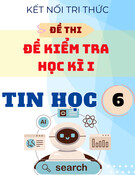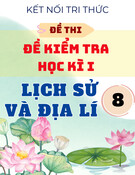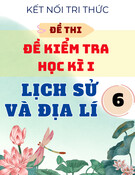
SỞ GIÁO DỤC VÀ ĐÀO TẠO
BẮC GIANG
KỲ THI CHỌN ĐỘI TUYỂN
HỌC SINH GIỎI QUỐC GIA THPT
NĂM HỌC 2024-2025
Môn: TIẾNG ANH
Đề thi có: 15 trang
Thời gian: 180 phút (không kể thời gian giao đề)
Ngày thi: 10/9/2024
ĐIỂM
BÀI THI
Bằng số:
Bằng chữ: ................................
Chữ ký giám khảo 1: ..........................................................
Chữ ký giám khảo 2: ..........................................................
LƯU Ý : - Thí sinh làm bài trực tiếp vào đề thi.
- Thí sinh không đ ợc sử dụng bất cứ tài liệu nào.
I. LISTENING (5.0 points)
The listening section is in FOUR parts. You will hear each part TWICE. At the beginning of
each part, you will hear a sound.
There will be a piece of music at the beginning and at the end of the listening section. You
will have TWO minutes to check your answers at the end of the listening section.
All the other instructions are included in the recording
Part 1. For question 1-5, listen to a recording about Apple Pay and decide whether the following
statements are True (T) or False (F) or Not Given (NG). Write your answers in the corresponding
numbered boxes provided.
1. The primary advantage of Apple Pay compared to other digital wallets lies in its own ecosystem it
operates on.
2. Banks have to allocate large portions of their own budget upon the rise of Apple Pay.
3. Traditionally, banks would receive profits via the use of bank cards from product sellers.
4. However, with the business model of Apple Pay, banks can only retain one fourth of the fees
charged to sellers.
5. Losing its own identity as a bank is the butterfly effect that banks are fearful of when letting Apple
Pay rise to its status.
Your answers:
1. 2. 3. 4. 5.
Part 2. For questions 6-10, listen to the recording and answer the questions. Write NO MORE
THAN TWO WORDS for each answer.
6. What human activity generates around 15% of the greenhouse gas emissions contributed by people?
____________________________________
7. As well as cutting down on meat consumption, what else should we endeavor to reduce?
____________________________________
8. Which important ecosystem is beef farming contributing to the loss of on a large scale?
____________________________________
9. There can be benefits to biodiversity from long-established farming practices of what?
____________________________________
10. Large volumes of water are needed for the cultivation of which type of nut?
____________________________________
Part 3. For questions 11-15, you will hear part of a radio interview with Adrian Jones, who has
special responsibility for overseas students at the University of Bridgeport. Choose the answer (A, B,
C or D) which fits best according to what you hear.
11. According to Adrian, most overseas students ___________
A. are on science and engineering postgraduate courses.
B. have never studied subjects in the humanities.

C. are studying for a business degree.
D. did not complete their first-degree course.
12. What does Adrian stress about overseas students at the university?
A. They all suffer from essentially the same problems.
B. The language problems they have are the hardest for them to overcome.
C. They are different from each other in many respects.
D. They are all from similar social backgrounds.
13. According to Adrian, the most serious problem for the majority of overseas students at
Bridgeport is ___________
A. learning to work with people from other countries.
B. finding a suitable place to live.
C. getting to grips with the way things are organized and run in Britain.
D. learning the university's rules and regulations.
14. Adrian makes the point that ___________
A. most overseas students lack self-confidence.
B. in the long term, we've all got to help ourselves.
C. it isn't uncommon for somebody's studies to be affected by family problems.
D. five overseas students had to leave because they couldn't cope with their coursework.
15. What statement from the interviewer does Adrian disagree with?
A. British students pay less to attend the university than foreigners.
B. Overseas students can get a place at the university even if they did relatively poorly at school.
C. The university would like to increase the number of overseas students.
D. Accepting more overseas students may damage the university's reputation.
Your answers:
11. 12. 13. 14. 15.
Part 4. You will listen to a piece of news. For questions 16-25, complete the summary by writing NO
MORE THAN THREE WORDS in each gap. Write your answers in the corresponding numbered
boxes provided.
16. In December 2015, China issued a red alert warning for their capital, Beijing due to its excessive
smog and ____________________.
17. Many ____________________ occupied top spots in terms of cleanliness according to the Green
City Index report.
18. While Denmark and Switzerland impose heavy restrictions on high polluting vehicles, there is also
a ____________________ to use public transit, bicycling and walking.
19. Curitiba in Brazil was the first city to introduce _____________in 1974.
20. Singapore keep the city clean through ____________________ and infrastructure investment.
21. ____________________ recycling and water treatment plants in Singapore are designed around
supplying the uniquely compact city.
22. Recycling a significant amount of waste, San Francisco is described as a ________________ city.
23. A way to maintain low use of energy in San Fransico is to require ____________________ to
submit energy usage reports on a regular basis.
24. Accra in Ghana get high scores for establishing a __________________ with the government.
25. In general, it is ____________________ to be involved that fundamentally contributes to the
protection of the environment.
Your answers:
16. 21.
17. 22.
18. 23.
19. 24.

20. 25.
II. LEXICO AND GRAMMAR (3.0 pts)
Part 1: Choose the answer A, B, C, or D that best completes each of the following sentences.
Write your answers in the corresponding numbered boxes.
26. Everybody present knows each other well enough for us to ________ formalities.
A. dispense with B. lay off C. write off D. rule out
27. It was a well-kept, ________ garden, stocked with exotic trees and fragrant flowering shrubs.
A. overgrown B. luscious C. luxurious D. luxuriant
28. The government needs to _____ businesses that have been trying to evade the tax.
A. put the screws on B. get into gear
C. put one over on D. wipe off the map
29. Their decision on whether I get the job or not will be based mostly on my academic ________.
A. reputation B. credits C. credentials D. standing
30. Over half of the population of this earthquake-stricken area are living ________.
A. on the house B. on the breadline C. on the tenterhooks D. on the cards
31. The bank robber was given two five-year sentences, one for each robbery, but luckily for him they
were to run ________.
A. consequently B. consecutively C. concurrently D. conspicuously
32. For the first few months, the babies looked so alike I couldn’t tell ________.
A. who is whom B. which from which C. which is which D. whom with whom
33. The small-scale demonstration later escalated into a ________ battle with the police, involving
more than 800 protesters and causing serious traffic congestion across the city.
A. pitched B. racked C. heaped D. scrap
34. Although the company seems very successful and popular, it has ________ actual money.
Everything is built off loans and debts.
A. less or no B. little or no C. many or not D. not any or little
35. I thought I had made it ________ that I didn’t want to discuss this matter any more.
A. distinct B. frank C. straight D. plain
Your answers:
26. 27. 28. 29. 30. 31. 32. 33. 34. 35.
Part 2: Write the correct form of each bracketed word in the space provided. There is an
example at the beginning (0).
Positive thinking
The body of evidence suggesting that positive thinking is an (0) _essential- factor in success continues
to grow. Many scientists are convinced that that optimism constitutes a more important (36.
PREDICT) ______ of academic achievement than IQ test
Psychologists define optimism not merely as a sunny (37. LOOK) ______ on life, but as the belief
that you can achieve your goals. The ability to attribute failure (and success) to factors outside yourself
is a crucial (38. CHARACTER) ______ of optimism, and results in more (39. MANAGE) ______
emotional reaction to events. The optimist sees failure as caused by something temporary and
changeable, and therefore her (40. INCLINE) ______ is to focus on how to avoid making the same
mistakes in the future. Optimists have a variety of attributes which enable them to (41. STAND)
______ the setbacks they encounter, like confidence in their (42. RESOURCE) ______ and the sense
to break up sizable goals into attainable (43. OBJECT) ______.
The pessimist, by contrast, blames himself for his failure, and concludes that he is simply incapable of
accomplishing a given task. He is comparatively (44. LIKE) ______ to look for external factors to
explain it and is more likely to sink into depression. Obviously, that has (45. IMPLY) ______ in all
areas of endeavor.
Your answers:

36. 37. 38. 39. 40.
41. 42. 43. 44. 45.
III. READING (6.0 POINTS)
Part 1. For questions 46-55, read the passage and fill in each of the following numbered blanks
with ONE suitable word. Write your answers in the corresponding numbered boxes provided.
Beyond genetics exploring the world of epigenetics
Epigenetics is an enthralling field of study that delves (46) ______ the inner workings of gene
regulation, unlocking the secrets of how genes are (47) ______ the shots in shaping our biological
destinies. The intricate mechanisms of epigenetics go (48) ______ the tip of the iceberg, revealing the
profound impact of environmental influences on our genetic expression.
At its core, epigenetics explores the heritable changes in gene function that (49) ______ in the family,
yet transcend traditional genetic inheritance. These modifications affect the nitty-gritty of gene activity,
dictating (50) ______ genes are turned on or off, thus influencing an organism’s development and
overall health.
(51) ______ of the most remarkable aspects of epigenetics is its adaptability, as genes respond to our
ups and downs in life, mirroring experiences and environmental exposures. These dynamic interactions
(52) ______ genes and the environment unveil the captivating dance of gene expression
In conclusion, epigenetics is a captivating frontier that (53) ______ the key to understanding the
delicate interplay between (54) ______ and nurture. By joining forces with traditional genetics,
epigenetics enriches our understanding of the intricate symphony of life and empowers us to unlock
the mysteries of our biological makeup. The profound implications of epigenetics extend beyond the
(55) ______, promising a new era of personalized medicine and a deeper appreciation of our shared
human journey.
Your answers:
46. 47. 48. 49. 50.
51. 52. 53. 54. 55.
Part 2. Read the following passage and do the task that follow.
The unrest behind the romance
According to Sydney Waterlow, the era of the romantic movement was a turbulent time in Britain,
politically and socially.
The greatest of Britain’s lyric poets, the culmination of the romantic movement in English
literature, appeared in an age which, following on from a series of successful military campaigns that
had established British power all over the world, was one of the gloomiest in the country’s history. If in
some ways the Britain of 1800-20 was ahead of the rest of Europe, in others it lagged far behind. The
industrial revolution, which in time transformed a nation of peasants and traders into a nation of
manufacturers, have begun; but its chief fruits as yet were increased materialism and greed, and
politically the period was far from calm.
Alone of European peoples, the British had been untouched by the tide of Napoleon’s conquest,
which, when it receded from the Continent at least left behind a framework of enlightened institutions,
while Britain’s success in the Napoleonic wars only confirmed the grip of ruling aristocratic families
on the nation which they had governed since the reign of Queen Anne. This despotism crushed the
humble and stimulated the high spirited to violence, and is the reason why poets such as Byron,
Landor, and Shelley, though by birth and fortune members of the ruling class, were pioneers of
political, as much as of spiritual, rebellion. Unable to breathe the atmosphere of England, they were
driven by the sensibilities to live in exile.
In their home country there was exhaustion after war; workmen being thrown out of
employment; high taxes, rents and corn prices; and a sense of fear arising from the French Revolution,

which had sent a wave of panic through the country which would last until about 1830. Suspicion of
republican principles – which, is seemed, led straight to organized slaughter - frightened many good
men, who would otherwise have been reformers, into supporting the establishment. The elder
generation of poets had been republicans in their youth. Wordsworth, for example had said of the
revolution that it was “bliss to be alive” in that dawn. Southey and Coleridge had even planned to
found a communist-style society in the New World. Now all three were committed to the defense of
order and property, as well as the Church and the throne. From their seclusion in the Lake District,
Southey and Wordsworth praised the royal family and celebrated England as the home of freedom.
However, England had ruthlessly stamped out the Irish rebellion of 1798, forced Ireland by fraud
into the union of 1800 and was strangling that island’s industry and commerce. Catholics could neither
vote nor hold office. In fact, at a time when the population of the United Kingdom was some 30 million,
the right to vote was possessed by no more than a million, and the majority of the seats in parliament
were the private property of rich men. Representative government did not exist, and whoever agitated for
some measure of it was deported to Australia or forced to flee to America. Glasgow and Manchester
weavers starved and rioted, but anyone not directly involved in such incidents didn’t necessarily hear
about them, as news publishers were tightly controlled. In 1812, bands of poor people were driven by
hunger to steal to feed themselves, placing themselves in mortal danger, for death was still publishment
for the theft of a loaf or a sheep. The social organism had come to a deadlock, on the one hand a starved
and angry populace, on the other a vast, powerful Church- and- king party, made up of all who had a
stake in the country.
In 1820 Shelly wrote what might be described as a not quite successful piece of satirical drama,
Oedipus Tyrannus or Swellfoot The Tyrant, inspired by the quarrel between the Prince Regent and his
wife. When the Princess of Wales, Caroline of Brunswick-Wolfenbüttel, after having left her husband
to leave in Italy, returned soon after the prince became George IV to claim her position as queen, the
royal differences became an affair of high national importance. The divorce case which followed
encapsulated the distempers of the age. Shelley felt that sort of disgust which makes a man rave and
curse under the attacks of some oppressive disease; if he laughs. it is the laugh of frenzy. In the play,
which was suppressed soon after publication, he represents the men of England as starving pigs
content to lap up whatever scraps their tyrant, the priest and the soldiers will allow them. At the end,
when the pigs, rallying around that triumphant princess, hunt down their oppressors, the reader cannot
help feeling a little sorry that Shelley does not permit a gentler mood into the work: there is an
unrelentingly cruel quality in his rumor even if it is justified.
Questions 56-58. Choose the correct letter, A, B, C or D
56. According to the text, in the early 19th century, people in Britain began doing what?
A. making goods B. joining the army C. growing food D. travelling abroad
57. The poets Byron, Landor and Shelley
A. supported Napoleon B. came from poor background
C. received an order to leave Britain D. were members of powerful families
58. Why did Wordsworth, Southey and Coleridge change their political views?
A. because of ordinary people’s poverty B. because they were losing money
C. because they feared the rise of violence D. because of their experiences overseas
Questions 59-62. Do the following statements agree with the information given in the reading
passage? Write:
TRUE if the statement agrees with the information
FALSE if the statement contradicts the information
NOT GIVEN if there is no information on this
59. Ireland and Britain agreed to a temporary union.
60. The British population was decreasing.
61. Newspapers made unrest seem more frequent than it was.



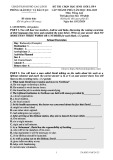
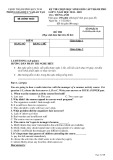
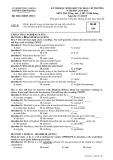
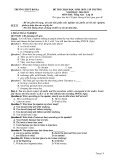
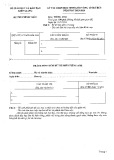
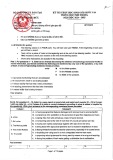
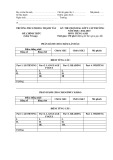





![Đề tham khảo ôn tập học kì 1 môn Toán lớp 6 năm 2025-2026 - Trường Trung học Thực hành Sài Gòn [Mới nhất]](https://cdn.tailieu.vn/images/document/thumbnail/2025/20251206/tnkhanh@sgu.edu.vn/135x160/64331765161604.jpg)



